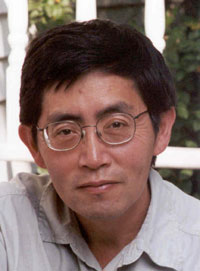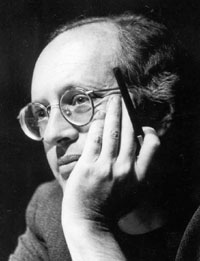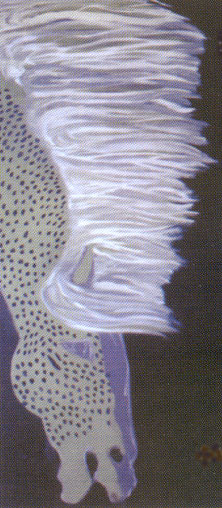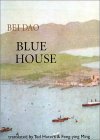
| NYWI HOME PAGE | VISITING WRITERS & EVENTS INDEX | VIDEO ARCHIVES |
 Bei Dao Bei DaoPoet and Writer |
 Eliot Weinberger Eliot Weinberger Translator |
NYS Writers Institute, November 29, 2001
3:00 p.m. Weinberger Seminar | Humanities Room 354, Uptown Campus
4:00 p.m. Dao "Craft of Poetry" Seminar | Humanities Room 354, Uptown Campus
8:00 p.m. Joint Reading | Recital Hall, Performing Arts Center, Uptown Campus
PROFILE
 Ben Dao is one of several pseudonyms employed in the past by the poet and writer
Zhao Zhenkai to conceal his identity from the Chinese authorities. "Bei Dao" means "North Island,"
and was chosen arbitrarily for the poet by a journalist colleague. It has no significance for its owner ,
beyond the fact that it is the name by which he is known to the rest of the world.
Ben Dao is one of several pseudonyms employed in the past by the poet and writer
Zhao Zhenkai to conceal his identity from the Chinese authorities. "Bei Dao" means "North Island,"
and was chosen arbitrarily for the poet by a journalist colleague. It has no significance for its owner ,
beyond the fact that it is the name by which he is known to the rest of the world.
One of China's most celebrated poets-in-exile, Bei Dao served as a member of the Red Guard during Chairman Mao's infamous Cultural Revolution. In 1969, however, he was sent into the countryside for "re-education "-- seven years of forced labor in the construction trade. During this time, Bei Dao became disaffected with the Chinese political system, helped to organize dissident reading circles, and began writing poetry and short stories. He distributed his work illegally, and helped to found one of China's most influential-- though short-lived-- underground literary journals, "Jintian" ("Today").
During a period of cultural openness in the 1980's, Bei Dao's identity became known, and he became more of a public figure as an outspoken critic of the government and society. When students took over Tiananmen Square in 1989, they recited his poetry as chants and emblazoned it on banners, notably the lines,
"I will not kneel on the ground Allowing the executioners to look tall"
Away in Berlin for a literary conference during the political crisis, Bei Dao was not allowed to return to his wife and child in China (they were reunited six years later). He has lived since that time in Europe and the U.S.
Written in a pioneering modernist style, Bei Dao's short stories tell of lives destroyed or rendered
absurd by the Cultural Revolution. Published in Chinese as "Bodong" (Hong Kong, 1985), and in
English translation as Waves (1987, ISBN 0-8112-1134-7), the stories established Bei Dao as one of China's leading
literary figures. Historian Jonathan Spence, writing in the "New York Times Book Review," called
the stories in "Waves," "almost unbearably poignant."
As a poet, Bei Dao is one of the inventors of "misty poetry ," an obscure, surrealistic, modernist
mode of expression that was originally designed to foil Communist Party censorship. His collections
in English translation include "Notes from the City of the Sun" (1983), "The August Sleepwalker"
(1988, New Directions, ISBN 0-8112-1132-0), "Old Snow" (1991, ISBN 0-8112-1183-5), "Forms of Distance" (1995), and "Landscape Over Zero" (1996). His
most recent collection, "Unlock" (2000, New Directions, ISBN 0-8112-1447-8), is composed of forty-nine new poems written in the United
States.
He lives with his daughter in Davis, California.
"To categorize Bei Dao as merely an exile or disssident is to miss the point. Bei Dao is simply a poet. There's no greater threat to totalitarianism than individuality, and few living writers possess a voice
as elegant as that heard in Unlock." - Andrew Ervin, Philadelphia Inquirer





PROFILE
 Eliot Weinberger translated "Unlock" in collaboration with the author and SUNY Stony Brook
Professor of History, Iona Man-Cheong. Weinberger will also translate Bei Dao's live reading from
the original Mandarin. In addition, Weinberger will read from his own body of distinguished work.
Eliot Weinberger is a translator of international renown. His edition of "The Selected
Non-Fictions of Jorge Luis Borges" (1999) received the National Book Critics Circle Award for
criticism. That same year, Weinberger received the Order of the Aztec Eagle, the highest honor the
Mexican government can bestow on a foreign national, for his numerous translations of Mexican
poet Octavio Paz. In 1992, he was named the fIrst recipient of the PEN/Gregory Kolovakos Award
for promotion of Latin American literature in the U.S.
Eliot Weinberger translated "Unlock" in collaboration with the author and SUNY Stony Brook
Professor of History, Iona Man-Cheong. Weinberger will also translate Bei Dao's live reading from
the original Mandarin. In addition, Weinberger will read from his own body of distinguished work.
Eliot Weinberger is a translator of international renown. His edition of "The Selected
Non-Fictions of Jorge Luis Borges" (1999) received the National Book Critics Circle Award for
criticism. That same year, Weinberger received the Order of the Aztec Eagle, the highest honor the
Mexican government can bestow on a foreign national, for his numerous translations of Mexican
poet Octavio Paz. In 1992, he was named the fIrst recipient of the PEN/Gregory Kolovakos Award
for promotion of Latin American literature in the U.S.
 In the course of many years of friendship, Weinberger collaborated with Paz on translations of
"Selected Poems" (1984), "The Collected Poems: 1957-1987" (1987), "A Tree Within" (1988),
"Reading John Cage" (1989), "Sunstone" (1991), and "In Light of India" (1997). He defines the
translator as "an actor playing the role of author," and says that "a translation is based on the
dissolution of the self."
In the course of many years of friendship, Weinberger collaborated with Paz on translations of
"Selected Poems" (1984), "The Collected Poems: 1957-1987" (1987), "A Tree Within" (1988),
"Reading John Cage" (1989), "Sunstone" (1991), and "In Light of India" (1997). He defines the
translator as "an actor playing the role of author," and says that "a translation is based on the
dissolution of the self."
Weinberger is also a critic and essayist with eclectic interests. His most recent collection of essays, "Karmic Traces: 1993-1999" (2000, New Directions, ISBN 0-8112-1456-7) is a wide-ranging exploration of poetry, places, peoples and cultures. Subjects include Aztec religious practices, the Vikings of Iceland, naked mole rats, and Hong Kong's transfer to China.
"an intellectual travelogue of surpassing wit" - Talk Magazine on Karmic Traces
"He is an eloquent and intelligent essayist whose prose charts various literary channels of cultural migration, like translation. . .Karmic Traces is. . .A vortex for the entire universe. . . a book that all readers of poetry need." - The Boston Review
"He has seemingly read, read about, or seen firsthand practically everything on planet Earth." - Multicultural Review
Additional Links
Writers Online Magazine Article
For additional information, contact the Writers Institute at 518-442-5620 or online at https://www.albany.edu/writers-inst.